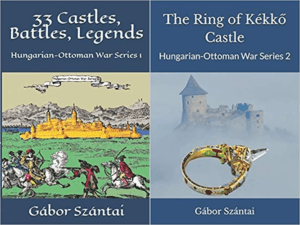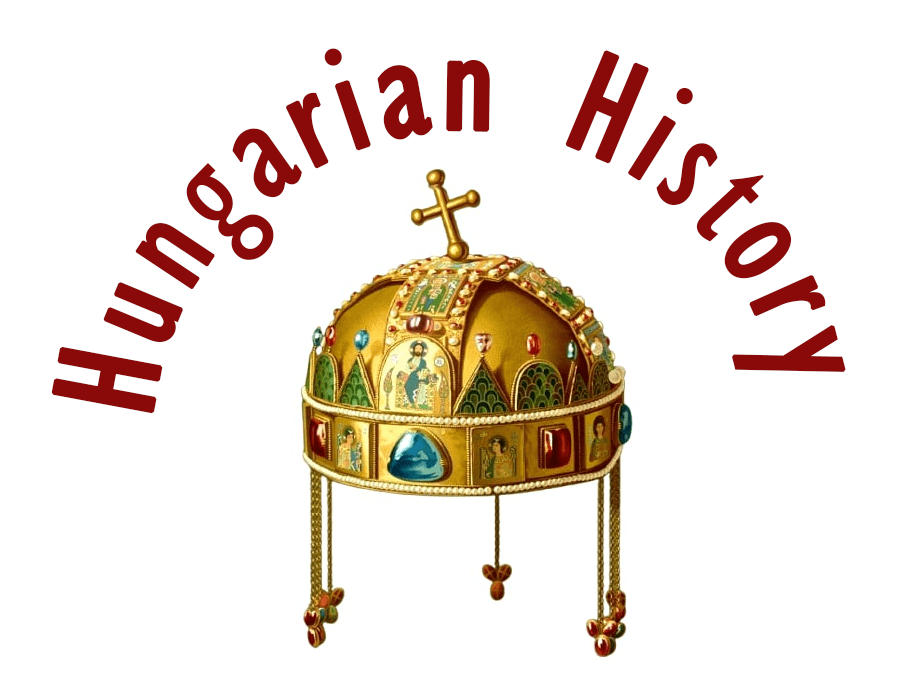The following dramatized short story is based on historical facts. It is one of the stories in my book “33 Castles, Battles, Legends”, written by Szántai Gábor.

“The Austrian clerk officer was sitting on a comfortable chair behind a makeshift table and the last warm sunbeams of October were caressing his back. In front of him, there stood the entire garrison of Komárom Castle, eagerly watching him as he tried to spell the barbarous-sounding Hungarian names from a long, never-ending list of names.
It was the long-awaited payday and the soldiers were relaxed in the knowledge that King Habsburg Rudolf would pay them at least a part of what he had been owing to them. Were they not luckier than the other warriors of the thousand-mile-long Borderland where they had to wait three or four years to receive half of the full sum? Gossip had that there was a God-forsaken far-away spot in the northeastern part of the frontier where the poor devils had to wait nine years. Half of them perished of hunger and the rest became villains, only eight Hussars remained behind the palisade walls. Komárom was lucky because it was blocking the Danube and the Viennese Court provided them with food and money relatively on time. The lords in Vienna knew that after taking Komárom, Pozsony would be the next and a gap would be opened to their city which was undefendable without the Hungarian circle of castles.
“Francois . . . Kudar . . . or Chudar . . . Chief Voivode of the Hungarian boaters, step right out.”
Old Ferenc Czudar smiled sourly. He was near to his 80th winter and no German officer could ever pronounce his name.
“Jawohl, Herr Captain,” he saluted and went to the clerk’s table where one of the two paymasters handed him sixty Hungarian Forints in gold. It was half of his annual pay and the king remained in debt with the second half. He was well aware of the difference in how the Austrian officers in the same position earned twice his pay but it was a general phenomenon among the simple soldiers as well. The foreign mercenaries everywhere got twice or three times higher pay and on top of that, they did not have to buy their food.
“As if these neatly uniformed monkeys were better warriors with their muskets and laughable small swords,” he muttered while returning to his men.
All the artillerymen and the infantrymen were Germans while there were Hungarian Hussars and boaters in equal numbers. Many of the slooters were of Serbian origin whose grandparents had fled here before the Turks. Those who could not flee joined the Ottoman army and many of the Ottoman boaters also spoke Serbian. They were better paid on the Turkish side, it was no question to old Czudar.
The Turks did not often dare to come any near to the formidable cannons of the three fortifications that guarded the water from three sides. The real work was always done by the Hussars who rode out every day to trace down the eventual Turk and Tatar raiders. Similarly, the boaters rowed and sailed endlessly on the Danube to do the same. Except, that the Hussars could always get hold of some booty, at least from duels. The Turks of Esztergom were a reckless and dangerous enemy whose main desire was to torment the small garrisons of the nearby Hungarian castles with raids, snares, and ambushes.
The clerk cleared his throat and began to struggle again with the next Hungarian or Serbian name when the alarm was sounded. The warriors were cursing the Turks as if they had intentionally devised to disturb this most important act of payment with their appearance but ran to arm themselves and wait for the orders. Eight Ottoman sloops had been sighted, rowing straight against the forts which were packed with dozens of cannons. Chief Captain of Komárom, Andreas Kielman was quick to respond and issued his orders. Most of the boaters took to their sloops and soon eighteen Hungarian vessels were hurrying toward the Turks in the hope of an easy victory. Ferenc Czudar was their Chief Voivode and he merrily told his sub-voivodes that whoever captured the first Ottoman sloop, would receive a double share from the booty.
The weather was splendid and they took advantage of the small western breeze which flew their triangular sails downriver. Twenty lads were rowing on each side of the narrow ships and the sound of their singing was heard long distance away. Old Czudar was standing on the prow of the leading sloop, waiting patiently when he could fire the single cannon from it. To his annoyance, the small Ottoman flotilla turned tail and fled just before they were in his cannon’s range. Scornful yells and catcalls came from the oarsmen and the Turks had to bear the shame forever. But Czudar did not want to let them slip away this easily. The chase has begun. It was so good to see the proud warriors of the famous Esztergom flee.
Right before the white walls of Esztergom Castle could be seen on the hilltop towering over the waters of the Danube, the river became narrower as the great curve between the mountains embraced it. Some movement caught the eye of the Voivode among the trees on the left bank. There was something shiny as well. Quickly looked at the right bank and his blood froze. White clouds of smoke puffed out on both banks.
“Bushfire?” he wondered. Then the unmistakable crackle of musket fire filled the air and a rain of bullets was knocking on the hulls of the sloops. The Turkish ships were elegantly turning and they were others to join them from the harbor of Esztergom.
“It is a trap!” Czudar bellowed and he realized how the Turks were playing with them. Ashamed, he gave the order to turn and retreat. His Hajdu musketmen tried to return the fire but Czudar angrily stopped them. The Ottoman marksmen could hide behind the willows and the alder trees of the flood area with ease, offering a very small target to the Hajdus. On top of this, the Turks had well prepared their trap because they carried out all the small-caliber cannons from the castle and deployed them along the two banks where the river was the narrowest. A musket was effective enough from this distance but the small cannonballs hit fist-size leaks on the ships’ planks. Two or three Hajdu lads fell already from each vessel, turning the blue water into red with their blood. Czudar estimated two or three hundred Janissaries on each riverbank who began walking upriver when saw the Hungarians flee.
Now, it was the real chase. Except, that the newly arrived Turkish sloops were more rested and they did not get tired of rowing like the Hungarian oarsmen. Advancing upriver proved a lot harder and a steady musket fire followed them from two directions. Occasionally, a cannonball splashed next to them, scaring the hell out of the rowers. Some of the vessels were already in far than mint condition and the hailing musket fire tore splinters and shreds of wood from their hulls. There was no more singing. The wounded were laid down in the ship’s hold and the crews were desperately rowing on with fewer and fewer strong hands to paddle. Smoke puffs appeared in the prows of the Turkish ships, as they were closing on. Czudar could do nothing for the four laggers who were unable to row hard enough.
Soon, they were flanked by Ottoman vessels, gangways were dropped and the Janissaries overran them from two sides. Knowing that they were being watched by their comrades, the Hajdus were too proud to surrender. They took many Janissaries with them to the other world with loud and angry curses. Three voivodes of the boaters perished there, men whom Czudar had shared most of his life with. They died proudly because the Turkish ships were slowed down by a few minutes.
The old voivode did not have much time to watch their last stand because three of his sloops began to sink. He immediately maneuvered his vessel next to one of them and saw that sloops on his left and his right hurry to save the other misfortunate boaters. They cared nothing for the whizzing bullets and fished the surviving crews on board. The newcomers were soon put to work, Komárom Castle and his yawing cannons were just too far yet. Old Czudar had many battles with the Ottoman raiders and he was one of King Szapolyai’s sloopers back in 1532 when they defeated the fleet of King Ferdinand.
“It was fifty-one years ago but I swear I have never been tricked like this,” he exclaimed to his steersman. The man opened his mouth to say something reassuring to his voivode but a bullet hit him off the boat. Voivode Czudar took his job over.
There were more boats beyond salvation by now and those who could not climb on a passing boat tried to swim ashore. Even the wounded jumped into the water from the sinking vessels and let their bodies carried by the current to the shore where the Janissaries herded all of them together. Good oarsmen had a high price on the slave market of Belgrade where they were sold to Italian or Turkish galleys.
Half of the Hungarian sloops were sunk when old Czudar could see through his tears the reinforcement arriving from Komárom.
“God may bless Captain Andreas Kielman.” cried the old man and new hope filled his heart seeing the five slow big ships coming before them with three cannons placed in each of their prows. It was the end of the Ottoman attack. When some of the Christians’ cannonballs hit home, the Muslim vessels came to a halt. It was pointless to expose themselves to unnecessary damage as the cannons of Komárom were already not very far, either.
When Ferenc Czudar tied his boat in the harbor and clambered up to the parade ground he thought it was an eternity ago that they had all been all standing there, waiting for their pay. Now, more than a hundred women were made widows and their sons were orphaned. He knew that the captured would never return home from slavery and the king in Vienna would not care to ransom them. Yes, the Turks broke the Truce but it does not mean they will let the prisoners go.
Voivode Czudar squared his shoulders and approached the paymasters and the clerks of the Viennese Court. Squeezing the share of what was supposed to be habitually given to the orphans and the widows out of these bureaucrats, would be harder than fighting a thousand pagans on the river.
“Let us not allow the Military Chamber to save money on the dead and their family.” he thought with tight lips.”
Dear Readers, I can only make this content available through small donations or by selling my books or T-shirts:
Please, support me with a coffee here: https://www.buymeacoffee.com/duhoxoxa
You can check out my books on Amazon or Draft2Digital, they are available in hardcover, paperback, or ebook:
https://www.amazon.com/dp/198020490X or at https://books2read.com/b/boYd81

My work can also be followed and supported on Patreon: Become a Patron!http://Become a Patron!
Become a Patron! and donations can be sent by PayPal, too: https://tinyurl.com/yknsvbk7


https://hungarianottomanwars.myspreadshop.com/all
Subscribe to my newsletter here: https://tinyurl.com/4jdjbfkn

